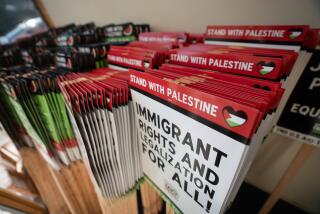COLUMN LEFT : Stand Fast for Talk, Not Battle : One doesnât have to embrace Hussein to oppose a U.S. war in the gulf.
T he man whose body was mutilated in war 22 years ago peered intently into the camera and said his piece again. âWe have thousands of young men and women in the Persian Gulf not to defend democracy but to protect the big oil companies. We donât want another Vietnam. How many more body bags and graveyards and monuments, how many more Americans coming home in wheelchairs like me, will it take before we learn? Stand up, speak out. . . . Didnât we promise ourselves we would never let this happen again?â
It was late afternoon 10 days ago in a Santa Monica office. Political and communications consultant Bill Zimmerman finally thought Vietnam activist Ron Kovic got it right. They began the business of editing the final 30-second spot. It had been commissioned by Operation Real Security, an Arizona-based nonprofit that offers information and financial backing to 1,500 peace groups across the country. Last Thursday the Kovic spot was released in Washington, and already groups in 50 cities are committed to buying local TV time to air it.
An anti-war movement is cranking up. This weekend there have been demonstrations across the country urging that the United States get its troops out of the gulf. All oppose a U.S. war with Iraq. More contentious is the issue of what to say about Iraq and its seizure of Kuwait.
Some, on the same ground as right-wing isolationists like columnist Patrick J. Buchanan, think that this issue can be passed over in silence and all emphasis placed on the task of getting the U.S. troops home. Others argue persuasively that to ignore the monstrosity of Saddam Husseinâs regime and the illegality of his invasion will doom the peace movement to charges of moral and political inconsistency.
In fact it is not contradictory to applaud United Nations sanctions as the correct response to Iraqâs invasion, denounce U.S. war plans for the gulf and demand a draw-down of the U.S. troops rushed there over the past 2 1/2 months. The proclaimed motive for sending all those troops and machines to Saudi Arabia was to protect the kingdom against invasion. It is highly unlikely that such an invasion was ever intended and any putative threat of this kind has long since receded.
The U.N. Security Council has mandated sanctions in the form of an embargo, nothing more. The peace movement can denounce any attempt by the United States to widen this mandate, demand a reduction in forces in the gulf and push for the remainder to be placed under U.N. command.
What the peace movement can demand, in step with its opposition to U.S. war in the gulf, is negotiations. And here lines are being drawn in the sand that are highly reminiscent of Vietnam. On Tuesday, Secretary of State James A. Baker III, reacting to speculation about an Iraqi withdrawal from most of Kuwait while retaining the Rumaila oil field and the two islands giving it greater access to the gulf, announced, âItâs our position that (Hussein) should not in any way be rewarded for aggression. We made this mistake in the 1930s. . . . We remember what happened in Ethiopia and . . . Europe when we refused to take a principled stand.â
This is self-serving nonsense. One thing clear from the statements of Bakerâs minions in the State Department before the invasion is that the United States was explicit in refusing involvement in border disputes and was eager to let Iraq and Kuwait know this. Suppose that the Emir of Kuwait, dismayed at seditious talk about democracy by Kuwaitis swarming through his hotel in Taif, were suddenly to accept a deal from Iraq. Hussein might offer the emir the return of most of his realm in exchange for a guarantee of responsiveness to Baghdadâs views on rates of production of Kuwaiti oil and kindred matters of concern.
Would the United States, in line with Bakerâs Tuesday statement, nix such a deal? And if a U.N. majority said such a deal resolved the crisis, what would the United States do then? For more than a quarter of a century, South Africa illegally occupied Namibia, plundered its resources and used it as a launching pad for attacks on Angola. The U.S. response was âconstructive engagementâ with South Africa.
Baker disclosed in his speech that Iraq has been trying to engage diplomatically. The United States should clearly respond.
So what the peace movement can do is say ânoâ to Iraqâs grab of Kuwait, ânoâ to a U.S. war and ânoâ to double standards about which land grabs and invasions the United States chooses to denounce. Already the popular mood is far more receptive to such a position than might have been imagined two months ago.
More to Read
Sign up for Essential California
The most important California stories and recommendations in your inbox every morning.
You may occasionally receive promotional content from the Los Angeles Times.










